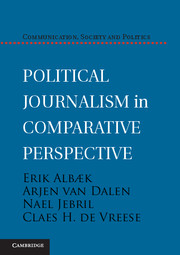Book contents
- Frontmatter
- Contents
- List of Tables and Figures
- Preface
- 1 Introduction
- 2 Comparing Political Journalism
- 3 Journalists
- 4 Journalists and Politicians
- 5 Do Role Conceptions Matter?
- 6 What Type of Journalism Produces Public Knowledge?
- 7 Does Infotainment Journalism Lead to Political Cynicism?
- 8 Good Journalism, Satisfied Citizens?
- 9 Political Journalism
- Appendix to Chapter 2
- Appendix to Chapter 3
- Appendix to Chapter 4
- Appendix to Chapter 5
- Appendix to Chapter 6
- Appendix to Chapter 7
- Appendix to Chapter 8
- References
- Index
8 - Good Journalism, Satisfied Citizens?
Published online by Cambridge University Press: 05 June 2014
- Frontmatter
- Contents
- List of Tables and Figures
- Preface
- 1 Introduction
- 2 Comparing Political Journalism
- 3 Journalists
- 4 Journalists and Politicians
- 5 Do Role Conceptions Matter?
- 6 What Type of Journalism Produces Public Knowledge?
- 7 Does Infotainment Journalism Lead to Political Cynicism?
- 8 Good Journalism, Satisfied Citizens?
- 9 Political Journalism
- Appendix to Chapter 2
- Appendix to Chapter 3
- Appendix to Chapter 4
- Appendix to Chapter 5
- Appendix to Chapter 6
- Appendix to Chapter 7
- Appendix to Chapter 8
- References
- Index
Summary
How Perceived Watchdog Reporting Affects Satisfaction with Political Coverage
Chapters 6 and 7 focused on the effects of specific content characteristics on citizens’ knowledge and cynicism about politics. In this chapter we investigate the dynamics of citizens’ satisfaction with political coverage. Media satisfaction is important since it is related to trust in other kinds of societal and political institutions and because the news media themselves have become an important political institution. The possible erosion in trust in media and politics has been addressed from a variety of perspectives in recent scholarship (Coleman, 2012; Quandt, 2012). We believe it is important to ground the discussion of satisfaction with political news in the practices of political journalism and the expectations that audiences have. In order to explore news satisfaction, we take a look at the watchdog journalism model and its relevance to the general public.
Central to this journalistic paradigm is the belief that journalists should carry out an investigative and watchdog role on behalf of the public (Waisbord, 2000), which finds expression in an objective, factual, and critical reporting style. An impartial approach to covering politics – focusing on factual information and balancing critique – is at the core of watchdog journalism. In terms of our three guiding concepts (see Chapter 1) it is evident that watchdog journalism leans toward the pragmatic end of the sacerdotal-pragmatic continuum since it explicitly questions authority and the powers of politics. At the same time, however, the impartial approach and the emphasis on information places watchdog journalism toward the informative end of the information-entertainment continuum and toward the balanced end of the impartial-partisan continuum.
- Type
- Chapter
- Information
- Political Journalism in Comparative Perspective , pp. 142 - 163Publisher: Cambridge University PressPrint publication year: 2014



